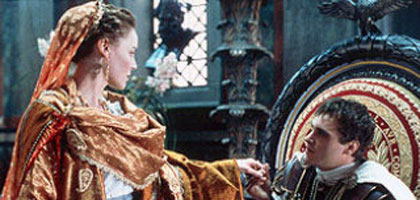
Decline and brawl
Film of the Month: Gladiator

Ridley Scott's Gladiator gives the sword-and-sandal genre a CGI makeover, mixing bloody spectacle with sly political satire. It's his best film yet, says Leslie Felperin
The Encyclopaedia Britannica imperiously dismisses the Roman philosopher-emperor Marcus Aurelius as a historically overrated figure, presiding in a bewildered way over an empire beneath the gilt of which there already lay many a decaying patch. In Ridley Scott's magnificent new action film Gladiator the patch has become a serious infestation of dry rot that no amount of gilt, indigo or porphyry can disguise. The damage is carved on the performers themselves, many of whom seem to have been cast for their interesting facial scars as much as for their acting ability. As we watch the story - of Maximus (Russell Crowe), a Roman general demoted to a gladiator-slave who eventually revenges himself on the emperor Commodus (Joaquin Phoenix), murderer of Maximus' family and of his own father Marcus Aurelius (Richard Harris), and the ruin of Rome -; it seems fitting that most of the awesome buildings we see are computer- or effects-generated. For all their seeming solidity, they're illusions standing in for ephemeral structures, projections of the melancholic Piranesian ruins they would become, as incorporeal and doomed as the neon-limned Los Angeles of Scott's Blade Runner. Look on ye mighty and despair.
The biblical and Roman epics of the 50s and 60s were spectacles tooled to lure back the crowds with their historically justified bloodbaths and widescreen scale after television had begun to erode cinema's audience. But they also fulfilled a more mass-psychological function. Clearly they were working out anxieties about the west's imperial role in the new world order, a west beset by barbarians on every front (The Fall of the Roman Empire, 1964, on which Gladiator is largely based); fears about growing secularism (Ben-Hur, 1959); and coded justifications for the growing civil-rights movement (Spartacus, 1960). Even if the heroes lose their lives in the film's short term, we know the values they stand for - individual freedom, democracy, republicanism, monotheism - are going to win in the end.
Gladiator's subtext is as frank as a codpiece. Rome here stands in for America: corrupt at its heart, based on enslavement, dedicated to sustaining pointless wars abroad while the mob happily forgoes a more civil society for bread and circuses. One of the film's better jokes is the way we're invited to see parallels between its gladiatorial arenas and the sports arenas of today, right down to the announcer/promoter (David Hemmings) who hypes up the combatants before the bouts. While serving up dollops of exquisitely choreographed violence, Gladiator the movie is nonetheless implicitly critical of the present-day culture which spawns television shows like, well, Gladiators - the spandex-clad mock-heroic gameshow - and makes modern emperors of sportspeople and entertainers. When Commodus' sister Lucilla (Connie Nielsen) tries to persuade Maximus to help her overthrow her brother, he complains, "I have the power only to amuse the mob." To which she replies, "That is power."
Having won the war against the barbarians, Maximus is a reluctant, apolitical hero. According to one report he was tellingly named Narcissus in David Franzoni's original script, since rewritten by John Logan and William Nicholson but still an admirably expository and cerebral piece of work. Battle-weary, Maximus dreams only of husbandry (in every sense of the word) and of rejoining his family either in Hispania or the afterlife. In the subtextual schema of the film, he's Shane with a shield, the good-but-innocent sword-slinger reluctantly recruited to clean up the town - or, given that he never actually gets to rule, Colin Powell, the most popular Republican president that never was. (You could have a lot of fun mapping the current US presidential race on to Gladiator - could spoilt, slimy Commodus be George Bush Jr.?) Thankfully, the film eschews the heavy-handed religious symbolism that weighs down the older generation of epics; human through and through, Maximus is no Jesus figure, though casting directors ought to take a look at fervid-eyed Phoenix if anyone's thinking of remaking the Passion.
An effortlessly charismatic screen actor, Crowe brings shades of his other well-known roles to the part: the ruthless violence of his neo-Nazi in Romper Stomper, the guileless strength of his thug cop in L.A. Confidential, his arrogant but righteous whistleblower in The Insider. Mel Gibson was apparently considered for the role (and it's easy to see how Braveheart was an exemplar for the story), but the choice would have been too pat, too easily crowd-pleasing. More deadpan and quotidian-looking, the younger Australian (mostly keeping his native accent, as do almost all the actors here, successfully suggesting the multicultural nature of the empire) commands the movie magisterially, never more so than when hacking down opponents with a casual economy of movement, barely breaking into sweat.
Maximus' humourlessness is delicately balanced by the preening lasciviousness Phoenix brings to Commodus, managing to wriggle out of the shadow cast by Christopher Plummer's own career-making turn in the same role in The Fall of the Roman Empire. With practically the only speaking part for a woman, Nielsen (kitted out in a fetching array of quasi-modern primitive frocks complete with bondage ribbons and hennaed bindi dots between her brows) shows impressive range and projects a regal sexiness. Finally, adding ballast to the rest of cast is a gaggle of old-timers: Derek Jacobi, invoking memories of his title role in I, Claudius, plays an epicene senator; Harris' Marcus Aurelius is both ethereal and imposing; and Oliver Reed - most of whose performance seems to have survived into the film considering he died while making it - swan-songs with his best performance since the Ken Russell days (the computer-generated footage of him is barely noticeable).
For my money, it's also the best film Ridley Scott has made (Blade Runner and Alien have been overrated for too long). Less an auteur than a top-dollar metteur en scène, he's a self-effacing master of the action sequence. Here he's made the quintessential big-budget studio product that's smarter than it looks, a fiendishly arduous logistical feat that clicks together like a well-tailored suit of armour. If there's a thematic line running through his work, maybe it's the focus on heroes - Deckard in Blade Runner, Ripley in Alien, even girl gladiator Jordan O'Neil in G.I. Jane - who put their necks on the line for corrupt organisations that don't deserve their loyalty (an allegory of the sacrifice film-makers make for studios and the braying spectator mob suggests itself).
Maximus defends the empire to Marcus Aurelius by saying he's seen the rest of the world and it's brutal and cruel and dark. Rome is the light. But his words seem mere idealistic rhetoric by the end: the light is dimming; the barbarians "don't know when they've been conquered"; the people don't deserve the republic he's returned to them. The promise (Titanic style) of recompense in the afterlife is the merest plaster over the decay that waits to spread.
